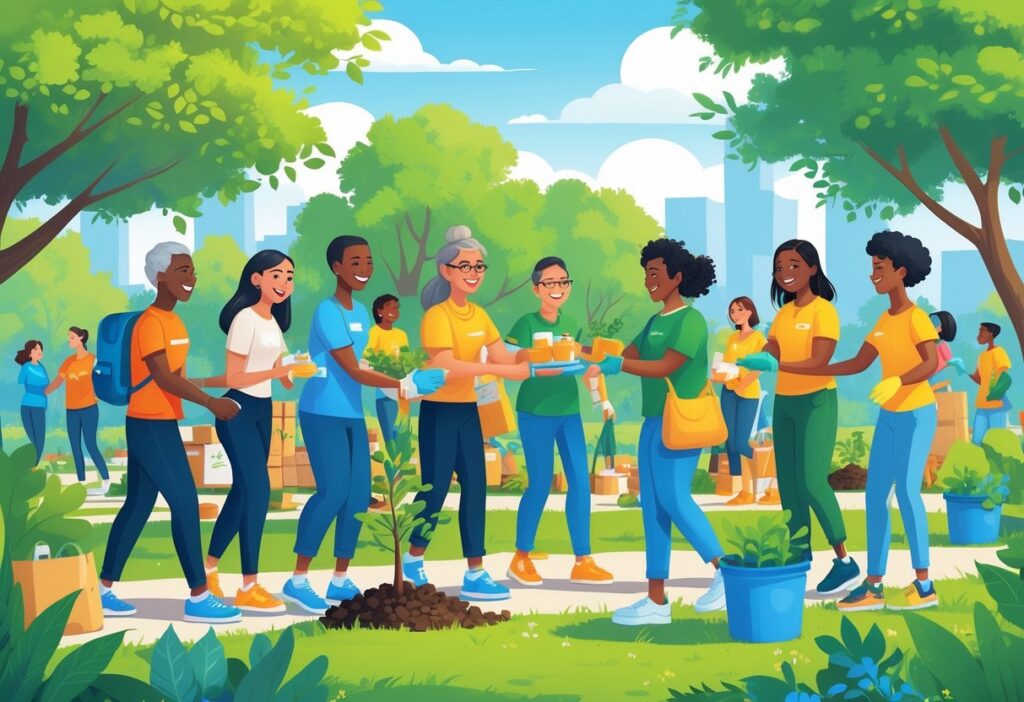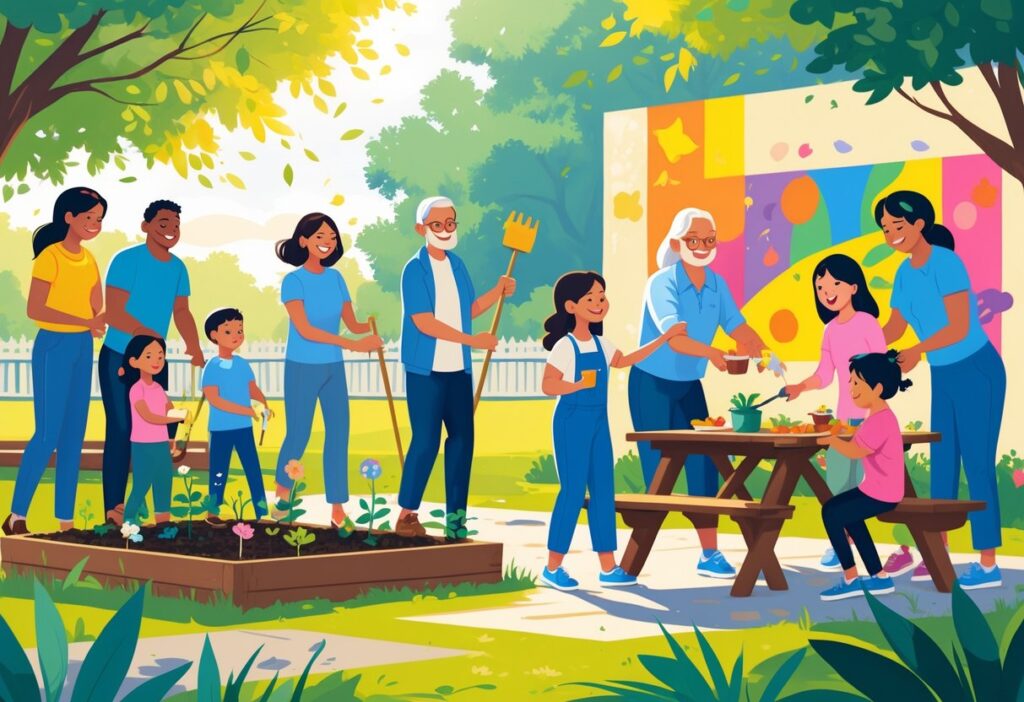Making friends as an adult can feel tough, especially when work and daily life eat up your time. Volunteering offers one of the most natural and effective ways to build genuine relationships while contributing to causes you care about.
When you work with others toward a shared goal, you start to create connections based on common values and experiences.
Unlike forced networking events or awkward dating apps, volunteering creates mutually beneficial relationships that develop organically. You meet people who share your interests and values, and you’re all focused on helping others rather than just making connections.
This takes the pressure off social interactions. Relationships get to form more naturally.
Whether you want to bond with family, find mentors, or just expand your circle, volunteering opens up a bunch of pathways to meaningful relationships. The trick is to pick opportunities that match your interests and to recognize how different types of volunteering can lead to different types of connections.
How Volunteering Fosters New Relationships
Volunteering gives you real chances to connect with people through shared goals and working together. When you team up for a common cause, you start to build trust and sometimes even friendships that last beyond the volunteering itself.
Shared Purpose as a Bridge to Friendship
When you volunteer, you’re instantly around people who care about the same things you do. That shared passion is a shortcut to starting conversations.
Working toward a common goal wipes away a lot of social awkwardness. You’re all focused on helping, not impressing each other, so the pressure’s off.
Volunteering builds meaningful relationships across diverse backgrounds by bringing together people from all walks of life. You might find yourself working with a retired teacher, a college student, and a busy parent—all united by the same mission.
The cause itself gives you something to talk about. You can chat about why the work matters to you, swap stories, and learn what motivates others.
These deeper conversations make stronger connections than just chatting about the weather or your job. Your shared experiences give you a foundation for future friendships.
You’ll remember the day you handed out meals together or cleaned up a park. Those memories stick and often become the start of lasting relationships.
Creating Lasting Bonds Through Teamwork
Volunteering means you have to rely on others to get things done. That teamwork builds trust and cooperation pretty quickly.
While working together, you see everyone’s strengths and quirks. Maybe someone’s great at organizing, while someone else connects easily with clients.
Working together for a common cause fosters deeper connections as you tackle challenges side by side. When problems pop up, you solve them as a team.
Those shared wins create strong emotional bonds. If you volunteer regularly, you’ll see the same faces over and over, letting friendships grow at a natural pace.
The teamwork skills you pick up—like communicating, listening, and supporting others—end up helping you build better relationships everywhere else, too.
Building Trust and Collaboration While Giving Back
When people give their time for free, you really get to see their character. You notice how they treat those in need, handle stress, and show up without expecting anything in return.
That’s the kind of thing that builds trust. Giving back together creates a kind of closeness you don’t always get from casual social stuff.
You share moments—comforting someone in crisis or celebrating a big fundraiser—that stick with you. Building relationships through community service means you start with mutual respect and shared values.
When you see someone always showing up to help, it makes you want to be friends. Your volunteer group can become a support network, not just during volunteer hours but outside of them, too.
People who care enough to volunteer often care about their fellow volunteers. Before you know it, you’re grabbing coffee or going out for dinner with people you met while helping out.
The Social Benefits of Volunteering

Volunteering gives you a real shot at meeting people from all sorts of backgrounds. Along the way, you pick up stronger communication skills and a better sense of empathy.
The shared purpose and meaningful work help you form connections that can boost your overall well-being.
Expanding Social Circles and Meeting Diverse People
Volunteering offers numerous benefits for making new friends because you meet people with similar values and interests. You end up working with folks of all ages, jobs, and cultures.
Food banks bring together retired teachers, students, and professionals. Environmental cleanups attract families, outdoor lovers, and local leaders.
This mix exposes you to new perspectives and experiences.
Common volunteer settings for meeting people:
- Community centers and food pantries
- Animal shelters and rescue organizations
- Libraries and schools
- Health organizations and hospitals
- Environmental groups and parks
You’re all committed to helping, which creates an instant connection. Working together toward a goal builds trust and friendship faster than most social settings.
Many volunteers stick with the same projects for years, which deepens relationships with other volunteers and community members. These connections often turn into real friendships outside volunteering.
Improving Communication and Empathy
Volunteering sharpens your ability to talk to people from all walks of life. You learn to listen and respond to different needs.
You might find yourself explaining things to elderly clients one day and encouraging nervous first-timers the next. Sometimes you’re coordinating with volunteers from totally different backgrounds.
Key communication skills you develop:
- Active listening—really paying attention
- Clear explanation—making things easy to understand
- Patience—working at someone else’s speed
- Cultural sensitivity—seeing things from different perspectives
This regular practice builds empathy. You start to see challenges through other people’s eyes.
The connection you form with those you help leads to genuine care. That kind of emotional growth spills into all your relationships, not just the ones at the volunteer site.
Enhancing Emotional Well-being Through Connection
Volunteering delivers significant mental health benefits thanks to the meaningful social connections you make. The sense of purpose and belonging helps cut down on loneliness.
Having regular volunteer work gives structure to your social life. You’ve got set times to see people and do something that matters.
There’s real joy in making a positive difference. Seeing the impact of your efforts can lift your mood and leave you feeling more satisfied.
Emotional benefits include:
- Less stress and anxiety
- A stronger sense of purpose
- More self-confidence
- Better overall mood
Research shows that over a third of adults aged 45 and older often feel lonely. Volunteering gives you regular, face-to-face interactions to help break that isolation.
The give-and-take of volunteer relationships means you both give and get support. That balance makes for healthier, longer-lasting friendships.
Volunteering and Relationship Building Within Families

When families volunteer together, they get a special chance to strengthen their bonds while serving the community. Sharing a commitment to giving back helps build stronger ties, sets shared values, and gives everyone a way to work toward something meaningful.
Strengthening Family Bonds Through Shared Service
Family volunteering provides a powerful way to build relationships by working toward common goals. When you volunteer as a family, you make space for conversations and connections that don’t always happen at home.
Working side by side lets family members see each other in a new light. Parents notice their kids’ compassion and creativity, while kids see their parents’ dedication.
Joint problem-solving during volunteer activities significantly boosts trust and cooperation within the family. When challenges come up, you have to work together to figure things out.
This teamwork builds important skills:
- Communication between ages
- Patience with different abilities
- Respect for everyone’s contributions
- Support during tough or emotional moments
Giving back together creates a foundation of mutual respect. You start to appreciate each other’s strengths and perspectives while working toward a common goal.
Creating Shared Memories and Values
Volunteering together means you’ll create memories that reinforce your family’s commitment to service. These become stories you tell for years, shaping your family’s identity.
Shared experiences during volunteer work can be more meaningful than typical family outings. Serving meals or cleaning up a park leaves you with memories tied to purpose.
Your family develops its own language around giving back. You reference specific volunteer days, laugh about challenges you overcame, and celebrate the people you helped.
These memories often turn into family traditions:
- Annual volunteer events as milestones
- Holiday traditions centered on service
- Birthdays that include helping others
- Family talks about social issues and what you can do
The values you show while volunteering sink into your family culture. Kids learn that helping others isn’t just talk—it’s something you all do together.
Organizing Family Volunteer Opportunities
Organizing family volunteer experiences works best when you match them to everyone’s ages, interests, and schedules. Start by finding causes that matter to the whole family and that offer activities everyone can join.
Look for local organizations that welcome families and make the roles clear. Plenty of nonprofits offer family-friendly volunteer days for different age groups.
Think about these factors when choosing:
- Time commitment that fits everyone
- Physical requirements everyone can handle
- Skill-building for kids and adults
- Regular vs. one-time opportunities
| Age Group | Suitable Activities | Skills Developed |
|---|---|---|
| Young children (5-8) | Food sorting, card making, park cleanup | Following instructions, helping others |
| Tweens (9-12) | Serving meals, reading to seniors, animal care | Responsibility, empathy, communication |
| Teens (13-18) | Tutoring, construction projects, event planning | Leadership, problem-solving, teamwork |
Start small with a one-day event before diving into ongoing commitments. This way, you can see what fits your family best.
A family volunteer calendar helps make service a regular thing, not just a special occasion.
Mentoring as a Gateway to Meaningful Connections
Mentoring creates deep bonds that benefit both mentors and mentees through shared learning experiences. These relationships often span generations and create lasting personal and professional networks.
Developing Mutual Growth Through Mentoring
Meaningful mentorship relationships create lasting professional and personal connections that go way beyond old-school, one-way teaching. When you mentor someone, you share your knowledge and, honestly, you get fresh perspectives in return.
Your mentoring relationship just works better when you find common ground with your mentee. Successful relationships are based on shared interests and values.
That connection grows deeper when your career goals line up.
Key benefits for mentors include:
Benefits for mentees include:
You create meaning through regular check-ins and goal-setting. These structured interactions help both people grow, not just at work but personally too.
Fostering Intergenerational Relationships
Mentoring naturally brings together people from different generations and backgrounds. You bridge generational gaps by swapping stories and learning from each other’s perspectives.
The mentoring relationship can be influenced by individuals in the mentee’s network and affects others in their circle. This creates ripple effects throughout communities.
Your role as a mentor goes way beyond career advice. You become a trusted advisor who helps someone navigate real-life challenges and decisions.
These relationships can last for years, sometimes decades. Plenty of mentors stay in touch with their mentees long after formal programs wrap up.
Ways to strengthen intergenerational connections:
The age difference turns into an asset, not a barrier. You offer wisdom from experience, and younger mentees teach you about new trends and tech.
Choosing the Right Volunteer Opportunity for Connection
Building relationships through volunteering really comes down to matching your interests with activities that get people working together. It helps to find opportunities that fit your schedule and location too.
Aligning Interests and Purpose with Volunteering
Your volunteer experience feels way more rewarding when you pick causes that match your own values. Finding volunteer opportunities that fit your strengths sets the stage for real connections.
Start by jotting down your hobbies and skills. Do you like working with kids, animals, or maybe the environment? Are you good at organizing or teaching?
Popular volunteer areas that foster connections:
When your interests match your volunteer work, you naturally click with like-minded people. You’ve got common ground from day one.
People stick with volunteering longer when they care about the cause. That gives you more time to build friendships with other volunteers.
Exploring Group-Based Volunteer Activities
Team-based volunteering is usually the best way to meet people. Look for chances to work with others toward a shared goal.
High-interaction volunteer activities:
Group volunteering activities usually kick off with training sessions where you meet fellow volunteers. Those early meetings help break the ice.
If your main goal is meeting people, skip solo volunteer roles. Stuff like online research or working alone doesn’t give you much social time.
Joining established volunteer groups, rather than just one-off events, makes it easier to make friends. Seeing the same faces over time just helps.
Finding Virtual and Local Volunteer Opportunities
Both local and virtual volunteering have their perks for building connections. Local gigs offer face-to-face interaction, but virtual options let you meet people from all over.
Local volunteer sources:
Virtual volunteer options:
Choosing between local and virtual opportunities really depends on your schedule and what you’re comfortable with. Local work lets you build strong in-person bonds, while virtual volunteering connects you with folks in different places.
A lot of organizations offer hybrid options now. You might do planning meetings online but show up for local events. That gives you flexibility and still keeps things personal.
If you want to meet people nearby, start with organizations in your neighborhood. Sites like VolunteerMatch or JustServe make it easy to find something close.
Enhancing Personal Meaning and Joy Through Volunteering
Volunteering brings emotional rewards that go way beyond just helping others. You find purpose and real happiness by making a difference in your community.
Experiencing Joy in Giving Back
Helping others naturally feels good. When you volunteer, your body releases endorphins—those “feel good” chemicals.
You get a real sense of happiness when you see the impact of your work. Serving meals at a shelter, for example, shows you exactly how you helped someone eat that day.
Physical benefits of volunteering include:
The joy comes from knowing your time matters. You create real change in people’s lives, even with small actions.
Volunteering can reduce stress levels and enhance overall life satisfaction. These mental health boosts make you feel more positive about life.
You build confidence with every volunteer task you complete. Success in helping others makes you feel capable and valued.
Cultivating Purpose and Personal Fulfillment
Volunteering can give life a deeper sense of meaning. You start to connect your daily actions with causes you actually care about.
Ways volunteering creates purpose:
- You align your values with what you do.
- You see how your skills make a real difference for others.
It connects you to something bigger than yourself. Suddenly, your free time has a bit more structure and direction.
Through volunteer work, you might discover what really matters to you. Maybe you find yourself drawn to working with animals, kids, or the environment.
Volunteering contributes to a sense of purpose and fulfillment by helping you build meaningful connections in your community. That sense of belonging? It can make everything feel more worthwhile, honestly.
Over time, your volunteer work just becomes part of who you are. You start seeing yourself as someone who actually makes a positive difference.
The new skills you pick up boost your self-worth. Learning while helping others leads to growth that sticks with you.






